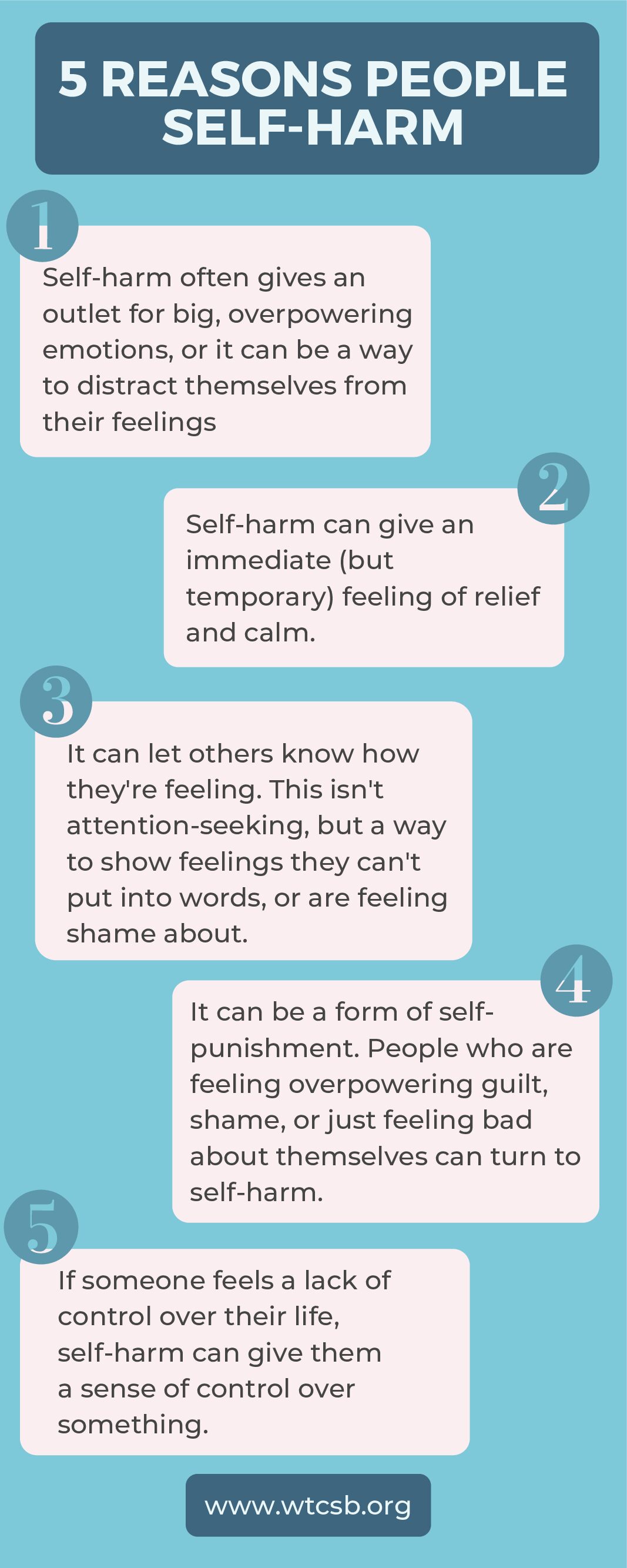If you don’t know anything about self-harm, it might be hard to understand why people would do it.
People who self-harm are sometimes seen as especially mentally ill, and are more stigmatized, but the truth is, self-harm isn’t always linked to mental illness.
It is, however, caused by mental distress.
What Is Self-Harm?
People who self-harm cut themselves (often on the arms or legs), burn or scald themselves with hot water, poke sharp objects into their bodies, scratch their body up or bang the head or other body parts into a wall or an object, purposely overdose on medications, and more.
It can seem irrational to someone who doesn’t understand where the urge to self-harm comes from, but it’s the way some people deal with overwhelming emotions they don’t know how to handle.
Why Do People Self-Harm?
People use self-harm as an outlet for overpowering feelings.
They may be experiencing feelings of guilt, shame, loneliness, anxiety, sadness, or even anger.
Self-harm can be different for everyone, but five common reasons people self-harm include:
1. Self-harm often gives an outlet for big, overpowering emotions, or it can be a way to distract themselves from their feelings.
Sometimes these emotions are so intense that they make us physically uncomfortable. When the body is injured, someone may feel those emotions stopping or not getting any worse, at least, or they may feel the physical discomfort going away.
2. Self-harm can give a feeling of relief.
For some people, it can give an immediate (but temporary) feeling of emotional and physical relief, or even a feeling of calmness.
3. It can be a way to let others know how they’re feeling
This isn’t attention-seeking, but simply a way to tell other people the feelings they can’t (or feel too ashamed to) put into words.
4. It can be a form of self-punishment.
People who are feeling overpowering guilt, shame, or just feeling bad about themselves can turn to self-harm.
5. It may give them a sense of control.
It may give those who feel that they don’t have control over their life or aspects of their life a feeling of control over their body.
Anyone may use self-harm as a coping mechanism, but it’s more prevalent in young people, those who have a mental health issue or a substance abuse issue, are part of the LGBTQ+ community, have lost a loved one through suicide, or have survived physical, emotional or sexual abuse.
This is because self-harm is often rooted in trauma – and treating the underlying trauma can help to reduce or completely stop this behavior.
While some people might want others to see their self-harm injuries, others are more secretive.
They may feel that their thoughts and feelings aren’t acceptable, or that others won’t understand why they self-harm.
Self-harm is serious.
While people who self-harm don’t usually want to die, self-harm can increase the risk of suicide.
People who self-harm are often just trying to find a way to deal with their emotions and the difficulties in life, but may unintentionally end their life through a medication overdose or other injury.
If you have a loved one who’s self-harming, it’s important to open up a dialogue and encourage them to seek help.
What Can I Do To Help?
In the moment, you can help by offering the comfort they’re seeking. You can do this by:
- Talking to them about something funny or light-hearted
- Embracing them or wrapping them in a tight blanket.
- Taking them on a walk outside in nature.
- Encouraging them to use methods like deep breathing, grounding, or acknowledging the emotions they’re feeling.
Ultimately, you want to refer your loved one to professional help.
Mental health professionals can use certain methods to help them learn to channel their emotions in a healthy way.
These might include short-term management methods like:
- Making lifestyle changes to avoid self-harm
- Discussing less harmful methods of self-harm for the present.
- Joining a support group.
And long-term management methods like:
- Developing new strategies for dealing with emotions to replace self-harm.
- Addressing any mental health or trauma concerns.
A Community of Hope and Caring
Because it often correlates with mental illness, and because of the chance of accidental death, self-harm can be very serious.
If your loved one is self-harming, they can reach out for help from the caring professionals at Western Tidewater CSB anytime!
We’re your local authority on mental health, and are held to a higher standard of service by the Virginia Department of Behavioral Health and Developmental Disabilities – and by ourselves.
We offer same-day access for crisis intervention.
Start by making an appointment now.
Click to enlarge infographic.
Share the Infographic! Click to get the embed code
<a href=”https://www.wtcsb.org/5-reasons-people-self-harm-and-how-to-help/” target=”_blank”><img src=”https://www.wtcsb.org/wp-content/uploads/2022/03/5-Reasons-People-Self-Harm-and-How-to-Help-Infographic.jpg” /></a







